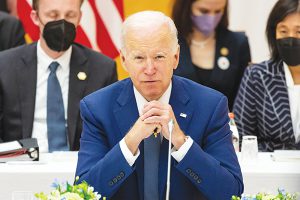Once is a gaffe, three times is a policy. During his trip to Asia, President Joe Biden stated, for the third time, that the US would defend Taiwan from a Chinese invasion, a comment seemingly at odds with Washington’s longstanding strategy of ambiguity on that subject.
Biden’s comments are starting to seem like a deliberate effort to strengthen deterrence without incurring all the costs of formally changing America’s stance. Yet if this is a sensible way of dealing with a sticky problem, it is also somewhat beside the point. The erosion of deterrence in the Taiwan Strait isn’t a matter of commitment; it is a matter of capabilities. Time is running out to reverse that dangerous trend.
For decades, Washington has had a policy of “strategic ambiguity†regarding Taiwan. It strongly implies that the US would not tolerate an unprovoked Chinese attack, but Washington has avoided a clear commitment, akin to an explicit alliance guarantee, for two reasons. First, such an ironclad promise might encourage irresponsible behavior by Taiwan, such as a declaration of independence from Beijing. Second, it might antagonise China, precipitating the very crisis the US aims to avoid.
Both concerns are becoming less compelling. Taiwan is not destabilising the relationship. It is China that is building and brandishing the military power necessary for a cross-strait assault. And as Beijing threatens to violently overturn the status quo, it is raising questions as to whether US policy should change, too.
The Biden administration initially declined to formally make this change, worrying that a shift to “strategic clarity†would cause Beijing, in the words of Director of National Intelligence Avril Haines, “to aggressively undermine US interests worldwide.†Instead, Biden has quietly and incrementally tightened military, economic and diplomatic ties to Taipei, while making several seemingly off-the-cuff statements that the US would not stand by if Taiwan were attacked. “That’s the commitment we made,†he said in Japan.
In each case, aides have “cleaned up†the president’s remarks, insisting that he has merely been restating America’s traditional policy. Or perhaps Biden is just telling the world what he really thinks.
This accidentally-on-purpose rhetorical strategy has its merits. It reduces any chance that China might attack Taiwan on the basis of a misperception that the US would stay out of the fracas, without triggering the diplomatic confrontation a formal shift would bring. Unfortunately, the administration’s “clarifications†have sometimes made the situation less clear, by implying that the US would not defend Taiwan.
More important, we shouldn’t exaggerate the effect that any shift in declaratory policy will have.
The root of the problem in the Taiwan Strait is not uncertainty about America’s strategic interest in preserving a free Taiwan. If Beijing did not believe there was a strong likelihood of the US defending the island, it would not be investing so heavily in antiship missiles, advanced air defenses and other capabilities meant to defeat the American military. The problem, rather, is the shifting balance of power.
People’s Liberation Army officials are reportedly growing more confident that Beijing could prevail in conflict with Washington over Taiwan. A lethal combination of geography (Taiwan is close to China and far from the US) and American lethargy (China has been modernising its forces far faster than the US has responded) has made the situation dire.
As Michael Beckley and I write in our book, “The Danger Zone: The Coming Conflict with China,†this problem will get worse in the next few years. The PLA will be completing its ambitious reform and modernisation program, while the US and Taiwan will just be starting to develop and field the capabilities, such as sixth-generation fighter jets and mountains of antiship missiles, for an effective defense.
In this context, statements don’t accomplish much. The US urgently needs to be reinforcing and dispersing its bases in Asia, so they are less vulnerable to a Chinese attack, and dramatically expanding its stockpiles of long-range and precision-guided munitions. The Pentagon needs the ability to break an air and maritime blockade of Taiwan, and to absorb a beating in the early days of a conflict and keep on fighting.
Washington must also develop a deeper political and military relationship with Taiwan, to improve cooperation in a crisis. It should coordinate major multilateral military exercises that simulate a broad, compelling response to Chinese aggression. And the US needs plans to rapidly scale up the production of ships, planes, missiles and other critical assets if the shooting starts.
To be fair, the Biden administration is working on these problems. The question is whether the US is moving fast enough to deter a conflict that may be much closer than many Americans realise. Clarifying, albeit in a muddled way, America’s commitment to Taiwan is useful. Showing that America can actually defend that island would be even better.
—Bloomberg
Hal Brands is a Bloomberg Opinion columnist. The Henry Kissinger Distinguished Professor at Johns Hopkins University’s School of Advanced International Studies, he is co-author, most recently, of “Danger Zone: The Coming Conflict with Chinaâ€
 The Gulf Time Newspaper One of the finest business newspapers in the UAE brought to you by our professional writers and editors.
The Gulf Time Newspaper One of the finest business newspapers in the UAE brought to you by our professional writers and editors.

